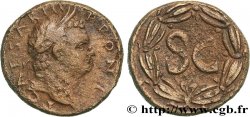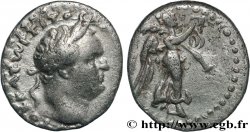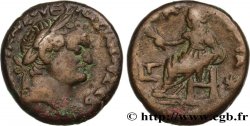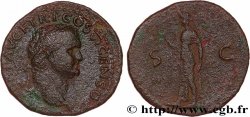brm_177137 - TITUS Denier
Not available.
Item sold on our e-shop
Price : 550.00 €
Item sold on our e-shop
Price : 550.00 €
Type : Denier
Date: 79
Mint name / Town : Roma
Metal : silver
Millesimal fineness : 900 ‰
Diameter : 18,50 mm
Orientation dies : 6 h.
Weight : 3,18 g.
Rarity : R2
Coments on the condition:
Exemplaire sur un flan parfaitement centré des deux côtés. Très beau portrait. Revers historiquement important. Jolie patine de collection ancienne avec des reflets dorés
Catalogue references :
Obverse
Obverse legend : T CAES IMP VESPASIANVS.
Obverse description : Tête laurée de Titus à droite (O*).
Obverse translation : “Titus Cæsar Imperator Vespasianus, ( Titus césar empereur Vespasien).
Reverse
Reverse legend : TR P VIII - COS VII P P.
Reverse description : Trophée aux pieds duquel se trouve un captif agenouillé.
Reverse translation : “Tribunicia Potestate octavum Consul septimum”, (Revêtu de la huitième puissance tribunitienne consul pour la septième fois).
Commentary
Ce denier fait référence aux victoires de Titus sur les Juifs ou d’Agricola sur les Bretons. Au revers le captif masculin semble nu et agenouillé, les mains liées dans le dos. Le trophée est constitué d’un casque, d’une cuirasse, d’un bouclier rond, d’un fourreau de glaive et de deux javelines entrecroisées qui ne correspondent en aucun cas à des armes bretonnes. Pour Titus, nous avons successivement trois émissions, la première Titus étant co-empereur (RCV. 2449), frappée avant la mort de Vespasien en juin79, puis une première émission de Titus auguste avec le revers précédent (RCV. 2505) et un nouveau revers avec une nouvelle salutation impériale (RCV. 2511) qui peut laisser penser à une série de victoires bretonnes. Ces trois types ont été frappés entre janvier 79 et juin 80.








 Report a mistake
Report a mistake Print the page
Print the page Share my selection
Share my selection Ask a question
Ask a question Consign / sell
Consign / sell
 Full data
Full data



